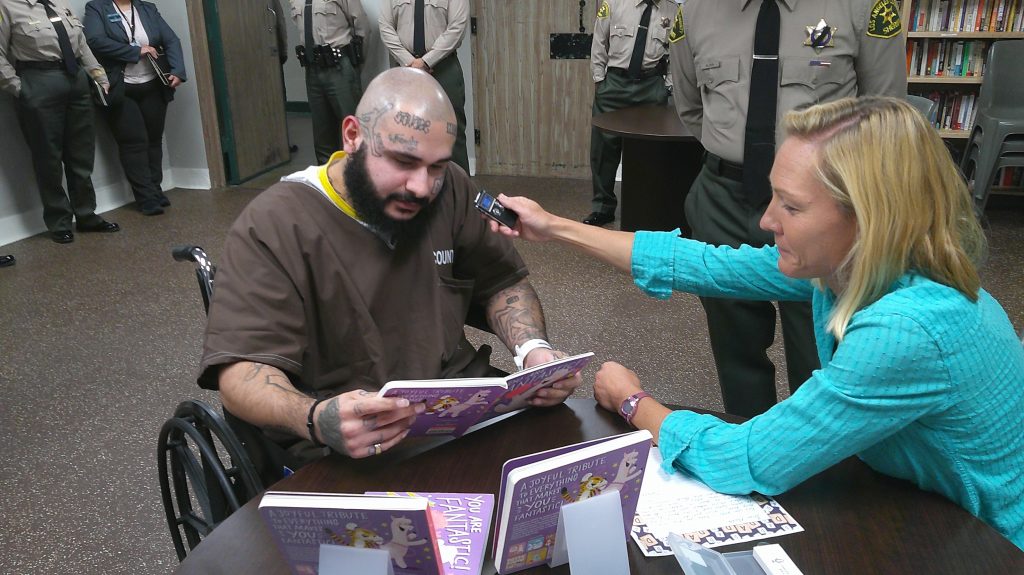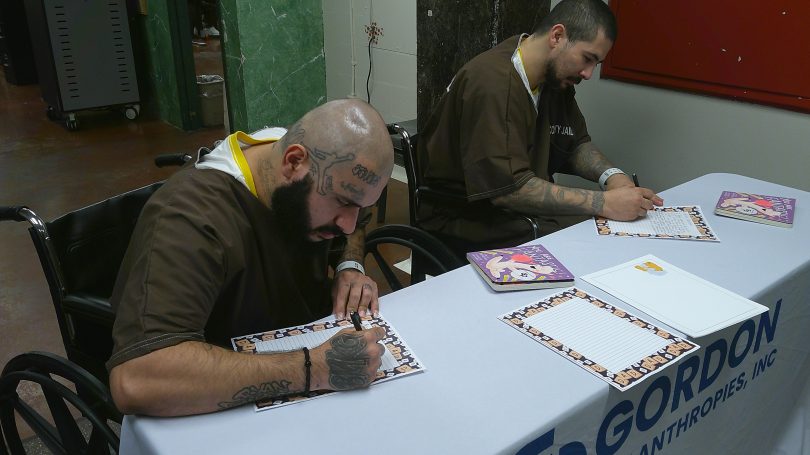By Victoria Valenzuela
From the time his son was born until he was three years old, Gerardo Pedrosa Jr. remembers raising his son, Aidan, and being there for his milestones. But after those first three years, Pedrosa was in and out of incarceration. Now his son is 10, and Pedrosa just wants to go home and be with him.
“I’ve raised him since he was small,” Pedrosa said. “I was there the first three years, then one year in, one year out, but I’m getting tired of it. I am getting too old for this.”
Pedrosa, who is 38, calls his son, Aidan, at least once a week. Father and son also send drawings back and forth.
Most recently, Aidan had sent his father a drawing of a robot. In turn, Pedrosa sent back his own drawing of a robot. Pedrosa has been drawing since he was a kid, so sending each other illustrations is something that has bonded them throughout his incarceration. But on May 22, Pedrosa was given a chance to connect with his son in a special new way.
On Dad-themed stationery, Pedrosa wrote a letter telling his son how much he missed him, and encouraged his son to “do good in school” and to behave for his grandma, with whom he is living. Following the letter, Pedrosa, who had just completed a parenting class certificate program the week before, sat across from a volunteer from Gordon Philanthropies, a nonprofit dedicated to improving literacy among those in underserved and marginalized communities. The volunteer used a voice recorder to capture Pedrosa’s voice reading a children’s book titled “You Are Fantastic,” by Sabrina Moyle.
The recording was then mailed to Aiden, who received it just in time for Father’s Day.
“It gives me a chance for my son to hear my voice, I get to send a book and a letter to him,” Pedrosa said. “It means a lot to me, because I love my son.”
Along with Pedrosa, 42 other men at LA County’s Men’s Central Jail, and the nearby Twin Towers facility, gathered in a classroom at their respective facility to write letters and record their voices reading the book, which would later be mailed for their children, along with the book itself, for Father’s Day.
This is the second annual “Sent With Love” event, hosted by Gordon Philanthropies in combination with the Los Angeles Sheriff’s Department. The parents say they value the program because it gives them a chance to connect with their children outside of 15-minute phone calls and handwritten letters.
“Our kids need us out there,” Pedrosa said. “It makes a big impact in their lives whether we’re there or we’re not there. It affects them.”
Nationally, about half of the people incarcerated are parents to a minor. Children with incarcerated parents are often thought of as the “hidden victims” of the criminal justice system, as the effects of incarceration ripple out and destabilize their lives in many ways.
At any given time, approximately 2.7 million children in the U.S. have an incarcerated parent, and 5.2 million have had an incarcerated parent at some point in their lives. The National Institutes of Health and the U.S. Centers for Disease Control (CDC) consider parental incarceration to be an adverse childhood experience. It has also been linked to increased depression and anxiety among children, and potentially has a subsequent impact on their financial, mental and educational well-being.
Yet programs like Sent With Love, which bring kids closer to their incarcerated parents, can make a big difference.
“It’s a way to make sure that dads are connected with their kids and celebrating Father’s Day,” said Sylvia Beanes, executive director of Gordon Philanthropies. “These children don’t have the opportunity to hug or be with their dads on such a beautiful day. Without that bond, children suffer academically.”
Children with an incarcerated parent are more likely to have lower educational attainment, behavioral issues and GPA declines, and are nearly six times more likely to be expelled or suspended from school. Beanes said that children of incarcerated parents also might carry around shame and guilt, which contributes to suffering academically.
Yet, research has also shown that strong ties with incarcerated parents can help mitigate these consequences and benefit both the parents and their children.
“This is just a very small act to create a special moment for the kids to be reminded that they are truly loved,” Beanes said.
Outside of these events, those incarcerated in the LA County jail system are able to make free phone calls to loved ones any time of the day (if a phone is available), and write letters to loved ones as well. LASD Lieutenant Rafael Rodriguez also said that the department is hoping to introduce tablets to the county’s jailed population, but there is no rollout date yet.
“To take that person who is very important to the family structure away causes trauma to the family, and certainly young children who don’t understand what is happening in many cases.”
The separation also affects “the individual who is incarcerated,” said Asst. Sheriff Sergio Aloma, who was present at the event. “When you have these holidays that remind them of family,” like Father’s Day, “it makes it even harder for them.”
Research makes clear that parents who are incarcerated also benefit markedly from maintaining family connections. Approximately 40% of men and 52% of women who are incarcerated had lived with their children prior to their arrest. Research tells us that strong family ties and regular visits have a big impact when it comes to reducing recidivism, or the likelihood the person will reoffend. Such relationships also measurably decrease depressive symptoms by interrupting the isolation of incarceration. Regular contact with family members reminds people who are incarcerated what is waiting for them at home.
In recent letters to his two step children—ages 6 and 9—and his 2-year-old nephew, Brian Huerta wrote heartfelt messages about how much he misses them, and encouraged the two older children to do well in school.
“Not a day goes by that I don’t think about them,” Huerta said.

Huerta, who grew up in foster care, was another participant in the “Sent with Love” Father’s Day program at Men’s Central Jail, and said it means a lot for him to be close to family and give his children everything he never had. He had to grow up fast, Huerta said, and didn’t want his children and nephew to feel the same way.
Research has also found that incarcerated parents are likely to have grown up in unstable or struggling households themselves. Approximately 17% spent time in foster care, 43% came from families that received public assistance when they were minors, and 32% had an incarcerated parent of their own. In other words, incarceration is an issue that can destabilize families for multiple generations.
After writing the letter, Huerta was able to sit across from a volunteer and record his voice reading to his children and nephew. Both of his children are in school so he particularly liked this Gordon Philanthropies program, as it felt like it supported their education.
“Everytime when they go to sleep, or every time they wake up, they can just press the button and it’ll be my voice reading them the book,” Huerta said. “It’s really amazing.”
It also helps that Huerta gets to talk to his nephew and stepchildren nearly every day. When he gets released, he said, he looks forward to being there for them, and giving them the childhood he never had.
“When I was out there, everytime I had the chance to spend time with them, I didn’t, and chose to do other things that were not productive,” said Huerta. “Now I sit back and I think about that. I should’ve given them all my time. I should have been there for them instead of making dumb decisions,” he said.
“Being separated from them hurts because I made bad choices that led me to where I’m at right now. But that doesn’t mean that I’m a bad person,” said Huerta. “It just means I made a bad decision.”
****

Author Victoria Valenzuela is an investigative reporter based in California, covering issues in criminal justice. She has previously contributed to The Guardian, BuzzFeed News, Bolts, LA Taco, and more. She is completing graduate studies at the University of Southern California.


Will this be a new thing for Deputies and Custody Assistants also? They never get to spend quality time with their kids or loved ones because of the ridiculous amounts of forced overtime.